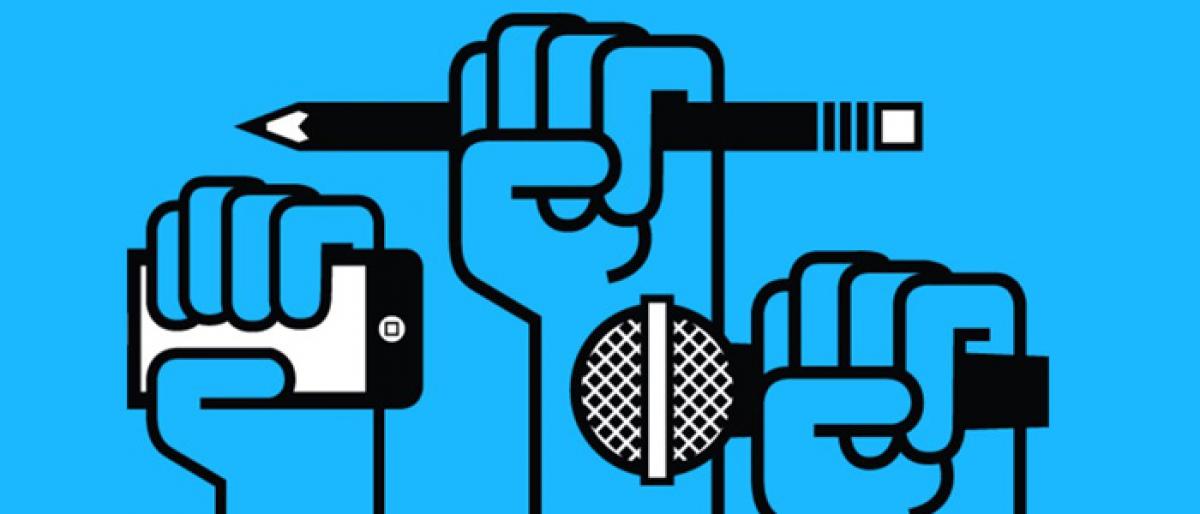Live
- ‘Garuda Prasadam’ at Chilkur Balaji throws traffic haywire on Moinabad Road
- GHMC approves 11,000 building permissions
- Members of Legislative Council Join YSR Congress Party in Massive Election Campaign in Buchireddypalem Mandal
- YV Ramireddy Criticizes MLA Sridhar Reddy for His Comments on Adala Prabhakar Reddy
- Visakhapatnam: Amid special prayers and bike rallies, candidates file nominations
- AIMIM works for its own welfare, neglects Old City denizens
- Palle Sindhura Reddy flays YS Jagan during election campaign in Puttaparthi
- Senior JSP leader Manukranth Reddy quits party, joins YSRCP
- Asad files nomination papers for Hyd’bad Lok Sabha seat
- GHMC implements weekly ‘basti’ action plan
Just In

As leaders from the 53 Commonwealth countries prepare to fly to London for a Summit meeting next week, six Commonwealth organisations are unveiling proposals for a 12-point Commonwealth Code of Conduct aimed at reducing murderous attacks on journalists and other threats to the media’s right to report.
As leaders from the 53 Commonwealth countries prepare to fly to London for a Summit meeting next week, six Commonwealth organisations are unveiling proposals for a 12-point Commonwealth Code of Conduct aimed at reducing murderous attacks on journalists and other threats to the media’s right to report.
The Commonwealth Principles on Freedom of Expression and the Role of the Media in Good Governance will be made public at the University of London’s Senate House, the home of the Institute of Commonwealth Studies (ICWS). The necessity of this code of conduct need not be overstated. Media freedom is hard won and needs constant vigilance and active defence.
Figures published by UNESCO, the UN Agency with a mandate to defend freedom of expression, show that fifty-seven journalists were killed for their work in Commonwealth countries between 2013 and 2017. This figure would only go up further if the recent killings in India are included.
If one considers the attacks on journalists as any other crime, well, the consequences could be worse. We have often seen Indian journalists protesting against the attacks on them but largely ignore the gravity of the same. For, it is not just media freedom that is in peril but also the very freedom of expression, as the Commonwealth Journalists Association puts it.
For the healthy growth of democracy, all the four pillars need to work in tandem in ensuring free flow of information to the people to decide and judge all these systems. If the other three – the Judiciary, the Legislature and the Executive – decide to infringe uponthe rights of the Fourth Estate, little progress could be achieved by any society.
It is strange that the governments of the day which call for setting up of international standards in every field, do not ensure best practices with regard to the relationships between the media and the three branches of government or talk about effective protections for the independence of the media and its role in informing the public.
UNESCO statistics show that fewer than ten per cent of all killings of journalists in Commonwealth countries have resulted in those responsible being brought to justice.
Human rights groups say that high rate of impunity is at odds with the Commonwealth’s commitments to the rule of law and protecting the media’s legitimate right to report in the public interest. The media also must scrutiny its conduct on its own in the first place. Take for example, the rape and murder of the eight-year-old Ashifa in Kathua or the Unnao dalit girl's rape story. Media did not have time for them till these incidents attained political overtones.
It is also shocking to see the wide coverage given to the perpetrators’ protests and their attempts at dividing the society further. Is that too a part of the balanced coverage? That is, why the efforts of the six Commonwealth organisations to put forward a “Manual of Good Practice” to assist governments, legislatures, judiciaries and the media to contribute in appropriate ways to promoting open, democratic and accountablesocieties, in accordance with Commonwealth values, are most welcome.

© 2024 Hyderabad Media House Limited/The Hans India. All rights reserved. Powered by hocalwire.com







